- Home
- Tom Stoppard
Rock 'N' Roll Page 5
Rock 'N' Roll Read online
Page 5
JAN Jesus, Ferdinand! What’s the question?
FERDINAND Who’s got the best chance of getting Husák’s attention—Havel or the Plastic People of the Universe?
JAN The Plastics.
FERDINAND I’ll put it another way. Who’s going to lay bare the ideological contradictions of bureaucratic dictatorship? Us intellectuals, or—?
JAN The Plastics. Why do you think you’re walking around and Jirous is in gaol?
FERDINAND Because he insulted a secret policeman.
JAN No, because the policeman insulted him. About his hair. Jirous doesn’t cut his hair. It makes the policeman angry, so he starts something and it ends with Jirous in gaol. But what is the policeman angry about? What difference does long hair make? The policeman is angry about his fear. The policeman’s fear is what makes him angry. He’s frightened by indifference. Jirous doesn’t care. He doesn’t care enough even to cut his hair. The policeman isn’t frightened by dissidents! Why should he be? Policemen love dissidents, like the Inquisition loved heretics. Heretics give meaning to the defenders of the faith. Nobody cares more than a heretic. Your friend Havel cares so much he writes a long letter to Husák. It makes no odds whether it’s a love letter or a protest letter. It means they’re playing on the same board. So Husák can relax, he’s made the rules, it’s his game. The population plays the other way, by agreeing to be bribed by places at university, or an easy ride at work … they care enough to keep their thoughts to themselves, their haircuts give nothing away. But the Plastics don’t care at all. They’re unbribable. They’re coming from somewhere else, from where the Muses come from. They’re not heretics. They’re pagans.
Blackout and ‘It’s Only Rock ‘n’ Roll’ by the Rolling Stones.
Smash cut to daylight and silence.
Autumn 1975.
Jan and Ferdinand sit almost in suspended animation. Ferdinand’s hair has been cut short. The lavatory flushes.
A man comes out of the bathroom, doing up his fly. He has a leather jacket, the jacket of choice for secret policemen.
POLICEMAN 1 (smirks) Apologies. My aim was off.
A second POLICEMAN stands at Jan’s record collection.
Okay?
POLICEMAN 2 Okay.
The Policemen leave together.
Ferdinand is phlegmatic. Jan leaps up.
JAN Oosh, whooof, shweez, hey, jesus, jeezuss …
Jan goes to look in the bathroom, and returns grimacing.
JAN (cont.) (scared) What did they want?
FERDINAND They didn’t want anything.
JAN Then why did they come up?
FERDINAND They were bored, probably. Usually they hang about outside.
JAN Outside my place?
FERDINAND Outside anywhere I go. (pause) I won’t come here, if you like.
JAN The thing is, I don’t feel grown-up enough for prison. That’s one thing. I’m definitely afraid of prison.
FERDINAND That’s nothing to be ashamed of.
JAN (snappish) I’m not ashamed of it.
He becomes accusing.
JAN (cont.) It’s normal to be afraid of prison. Normal people don’t do things that might send them to prison. I can’t even remember what you did, or who it was supposed to help. Of course, I understand it was for being heroic, I just forget the details. You must be bloody stupid going to prison for something I’ve forgotten before you come out, frankly. Heroism isn’t honest work, the kind that keeps the world going round. It offends normal people and frightens them. It seems to be about some private argument the heroes are having with the government on our behalf, and we never asked you.
FERDINAND Relax, Jan.
JAN Well, it’s very annoying. Heroic acts don’t spring from your beliefs. I believe the same as you do. They spring from your character. It’s not the action of a friend to point out that your character is more heroic than mine. It pisses me off. Why do you do it? You’ll be insufferable now.
FERDINAND Do you complain to Jirous?
JAN No. Jirous’s character is heroic and there’s nothing to be done about it. He was a heroic baby.
FERDINAND I met him in prison.
JAN Did you? How did he look with a haircut?
FERDINAND He explained about the hair. The tempter says, ‘Cut your hair just a little, and we’ll let you play.’ Then the tempter says, ‘Just change the name of the band and you can play.’ And after that, ‘Just leave out this one song’ … It is better not to start by cutting your hair, Jirous said—no, it is necessary. Then nothing you do can possibly give support to the idea that everything is in order in this country. Why couldn’t you have explained this? I would have signed your hopeless letter. Other bands have better musicians but the Plastics are the only band safe from the desire for recognition. In the alternative culture, success is failure. Look what happens in the West, Jirous says.
Jan has calmed down. He selects a record to play.
JAN Yeah … the Grateful Dead must be so envious of the Plastics …
The record starts to play—‘Chinatown Shuffle’ by the Grateful Dead.
JAN (cont.) (after a moment) How’s Magda?
FERDINAND What?
JAN How’s Magda?
FERDINAND I don’t know.
Jan nods sympathetically. They sit listening.
Blackout and the Grateful Dead continue through amps.
Smash cut to Cambridge. May 1976. Interior and garden.
The dining table is cleared for a tutorial.
LENKA, aged twenty-nine, is waiting for Eleanor. Lenka personifies a period look from her granny glasses to her smock and sandals. She carries her books in a canvas shoulder-bag. Her hair is long and unkempt. Lenka has a Czech accent.
Max is sitting in the garden with NIGEL, who is about thirty years old.
Eleanor enters the dining area, wearing a tea cosy for a hat.
ELEANOR (entering) Right. Sorry. Off we go.
They need a few seconds to get launched.
NIGEL Are you still a member of the Communist Party, Max?
MAX Yes.
NIGEL I find that fascinating.
MAX I know. (shouts for help) Nell! Nigel’s here!
Eleanor makes an impatient sound, gets up, goes swiftly to the frontier between indoors and outdoors.
ELEANOR Shush—it’s Alice’s nap.
Indoors, a five-year-old starts calling for ‘Granny’.
ELEANOR (cont.) Oh, for heaven’s sake!
NIGEL Should I -?
ELEANOR No. Hello, Nigel.
Eleanor hurries back through the dining area.
ELEANOR (cont.) (to Lenka) Sorry.
Eleanor leaves towards the child, already addressing endearments.
NIGEL Was that a tea cosy on her head?
MAX Yes.
NIGEL (pause) Do you mind if I ask you a question?
MAX She didn’t like me saying you couldn’t tell her wig was a wig.
NIGEL No, not about that. But with Communism, my paper wouldn’t be allowed to criticise the government, or even … well, you know what I mean. If you had your way, the Cambridge Evening News would be a very different sort of newspaper. As would all the media. Well, you’re much cleverer than me. Obviously. So my question is: am I missing something?
MAX Yes.
Max gets up and goes indoors.
LENKA Hello.
MAX Hello. I’m Max.
LENKA I know. We met once with Jan.
MAX Jan’s friend.
LENKA Lenka.
MAX Lenka. He went home.
LENKA I stayed.
MAX Of course. Philology?
LENKA And Classical Studies.
Nigel comes passing through.
NIGEL I’ll go and rescue her.
He leaves.
LENKA Eleanor is wonderful!
MAX So, what …?
LENKA Consciousness in Sappho.
MAX Oh, well, yes, Eleanor’s your man for Sappho.
LENKA But you f
or consciousness.
Lenka smiles at him.
Eleanor comes back, now wearing a wig.
ELEANOR Sorry. I hope I didn’t frighten you. (to Max) You might have told me. What are you doing home anyway?
A passing kiss.
MAX Don’t see enough of Esme.
ELEANOR Well, as you see, Lenka—
MAX Can I listen in?
ELEANOR What? No!
MAX Fly on the wall.
ELEANOR In the ointment, more like.
LENKA I don’t mind, Eleanor.
ELEANOR I do.
MAX Oh, come on, consciousness is my sack, after all.
ELEANOR I think you mean your bag, but be that as it (may)—
LENKA Actually, I read your book, Professor Morrow.
MAX Class and Consciousness or Masses and Materialism?
ELEANOR Sappho’s not in there, is she?
MAX Ha-ha, Cecil B. DeMorrow; no, she isn’t.
LENKA It made things clear for me.
MAX I’m definitely staying.
LENKA I think you’re wrong, you see.
MAX Great.
He sits down opposite Eleanor, rubbing his palms together. Lenka’s place is diagonal to Max down the table.
ELEANOR Max.
MAX Esme’s going to be here in a minute to pick up Nigel and the kid. (to Lenka) Child-minding. She’s a doting granny, don’t pass it around.
Eleanor laughs, pleased. Max squeezes her hand. A moment.
MAX (cont.) (to Lenka) Go ahead.
ELEANOR You don’t know the text.
MAX Fine. Call me Max.
ELEANOR She doesn’t have to call you anything, because you’re not—
MAX Fine.
Eleanor gives Lenka the nod.
ELEANOR Will you start?
LENKA (pause) No, you start. No, I’ll start. (pause) My mind’s gone blank.
MAX All right, I’ll start—
ELEANOR (shouts) You don’t even know—
MAX Fine.
ELEANOR I’ll start. Sappho begins, ‘He seems to me equal to a god …’
LENKA Right!—She begins not with the love object but with the man who’s getting all the love object’s attention—which to Sappho makes him seem equal to a god. I see it as a group of friends round a table having lunch maybe, and in the poem Sappho is describing what it’s like to experience love and desire and jealousy. Because there, down the table, this man is leaning in to listen to her girl’s sweet speaking and lovely laughing, and it’s Sappho’s body that goes beserk. Her heart jumps around like a bird beating its wings, her eyes stop seeing, her tongue breaks, her ears fill up with noise, her skin goes hot, then cold and clammy, her body’s out of control—it’s all happening like that, in the third person, these things are behaving like that. Out there.
ELEANOR But the first-person singular comes back—‘I’m green, I’m gone, dead or almost.’
LENKA So, okay. But the subjective experience of the objective world when that world includes the poet is obviously paradoxical—
ELEANOR ‘Obviously’ is a word I don’t allow. It usually means that something is far from obvious. For instance, can you lump together what’s in Sappho’s consciousness with what’s physically ‘out there’ in the objective world, like the birds and the bees?
Max nods and does a thumbs-up: yes, you can.
ELEANOR (cont.) Experiencing love is different from experiencing a bee sting.
Max converts the gesture into waggling his hand palm-down.
LENKA The paradox I mean is that Sappho is describing her own consciousness from outside itself, she describes the feeling of love as objectively as she might describe being stung by a bee.
ELEANOR What she is describing is the physiology.
MAX Same thing.
ELEANOR (smoothly) Which is obviously not the same thing.
Max picks up on ‘obviously’. Eleanor affects not to notice.
ELEANOR (cont.) Seemingly not the same thing. When you say, ‘I love you,’ you’re not saying ‘Darling, I notice some rather unusual events in my body.’
Max nods vigorously to disagree.
ELEANOR (cont.) Unless you’re odd.
Max smiles at her.
LENKA (agreeing) Unless you have a materialist agenda.
Max smiles at Lenka.
ELEANOR And anyway, Sappho’s list of symptoms could be describing other causes, like fear or embarrassment, or influenza, for that matter.
LENKA Exactly! How do we know it’s love? Because the poet knows! The mental separates from the physical. Sappho has a mental cognition of love; not influenza.
Max mimes despair.
LENKA (cont.) If she’s stung by a bee, she feels the sting, and she locates the bee in the objective world. If she’s stung by love, she locates Aphrodite as the stinger.
Max is dumbfounded.
ELEANOR Aphrodite?
LENKA Aphrodite exists for her. Like Eros. Like all the gods. They become the acting agent, and Sappho becomes the object acted upon.
MAX Hang on.
ELEANOR Yes, hang on. (to Max) You just be quiet.
LENKA ‘Aphrodite, come to me!’ she cries. And, ‘Eros shook my mind like the wind shakes the oak trees’ … ‘Eros!—who melts my limbs, sweet-bitter rascal …’
Max puts his head on the table.
ELEANOR There are some among us who possibly consider Aphrodite and Eros to be a sort of metaphor …
Lenka rounds on Max.
LENKA There are some among us who think knowledge is advanced when we give something a new name. Goodbye, Eros; hello, libido. Goodbye, Muses; hello, inspiration.
MAX There are some among us who thought we’d liberated reason from our ancestral bog of myth and claptrap. Inspiration doesn’t exist either, by the way, except as so many neuron-firings whizzing about the cortex.
LENKA Maybe we lost something older than reason, and stranger than your pinball machine which thinks it’s in love.
MAX Pinball machine isn’t bad. It does love. It does inspiration. It does memory. It does thought. If mental is separate from physical, how does it make Sappho go hot and cold and deaf and blind at lunch?
LENKA I don’t know. Sappho didn’t know why things fall to the floor. So what? They fell anyway. She looks down the table and she is in love separate from her body. (She plays her trump.) If it’s an illusion, who’s having it?
MAX Not ‘who’—’what’. Her brain’s having it.
LENKA Her mind?
MAX Her mind is her brain. The brain is a biological machine for thinking. If it wasn’t for the merely technical problem of understanding how it works, we could make one out of—beer cans. It would be the size of a stadium but it would sit there, going, ‘I think, therefore I am.’ (to Eleanor) You’re very quiet.
ELEANOR Well, I’ve heard it before.
Lenka laughs and brings out her roll-your-own kit.
LENKA What you like about brains, Max, is that they all work in the same way. What you don’t like about minds is that they don’t. To you consciousness is subversive—because your thing is the collective mind. But politics is over. You’re looking for revolution in the wrong place. Consciousness is where it’s at now. We have to rediscover our human mystery in the age of technology. Have you read Zen and the Art of Motorcycle Maintenance?
She slides a book down the table.
LENKA (cont.) Borrow it.
ELEANOR Is that grass, Lenka?
LENKA Yes, do you want some?
The child is heard from within. A car is heard tooting.
ELEANOR No, thank you. And that’s Esme. Sorry about the interruptions.
LENKA Oh, no, it was good.
ELEANOR I meant Alice.
MAX (put out) I’ve never let anyone have the last word yet.
LENKA (laughs) I’m always available.
ELEANOR Next time we might do a little Greek.
Eleanor goes out.
Noises off and voices, Eleanor answ
ering ALICE. Lenka packs her shoulder-bag.
LENKA That was really, you know, great …
MAX (declining her spliff) Ah, no thanks.
LENKA I’m at Newnham.
MAX Maybe I’ll see Jan in the summer vac. I’ve been invited to Prague for a brain-science bunfight.
LENKA He’s in prison, didn’t you know?
MAX No! No, I didn’t.
LENKA Yeah. I heard he was one of the ones arrested.
MAX One of what ones?
LENKA With the Plastic People of the Universe and—
MAX The what? What, you mean the thing I was just—I was asked to sign a letter, along with a select bunch of the usual chest-beaters about some pop group—I had no idea Jan …
LENKA Did you sign it?
Eleanor comes back.
ELEANOR It’s Esme, whom you don’t see enough of—she’s not coming in, she has to catch the shops.
MAX Jan has been arrested.
Max goes out.
LENKA Yes. That’s bad. (pause) Well, thanks. I’ll see you when I’ve …
ELEANOR (pleasantly) Good. And, Lenka, don’t try to shag my husband till I’m dead, or I’ll stick the art of motorcycle maintenance up your rancid cunt, there’s a dear.
Eleanor drops the book into Lenka’s shoulder-bag. Lenka gives a gasp, a sob, tries to speak, and leaves by the garden.
In the house there are sounds of departure, the door closing.
Eleanor remains still, in an exhaustion which she dissembles when Max returns, but she remains taut.
MAX I say, I upset Esme … I told her about Jan, and she …
ELEANOR Tsk, damn …
MAX … sort of burst into tears. Did I miss something?
ELEANOR Yes.
MAX Do you think so? What, because she made me bring him pop music?
ELEANOR She asked Jan to take her virginity.
MAX What? When?
ELEANOR His last night in England.
MAX Oh. I’m glad I didn’t sign that letter now.
ELEANOR Jan told her not to be silly. He took one of her records instead.
MAX Ah. How bourgeois of him. Well, all right. And now he’s in the jug for some pop group thing, Lenka says. I was asked to sign a protest. Had to suck my pen a bit. Should pop singers be locked up or given lots of money and treated like gods? That’s a hard one. Listen, don’t laugh but I think Lenka fancies me.
ELEANOR Never. Do you think there’s anything, anything at all in what she’s saying?
MAX No. Consciousness is not where it’s at. It doesn’t determine the social order. It’s the other way round.

 The Dog It Was That Died and Other Plays
The Dog It Was That Died and Other Plays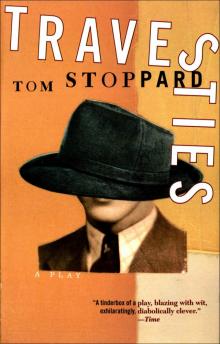 Travesties
Travesties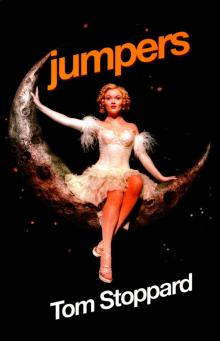 Jumpers
Jumpers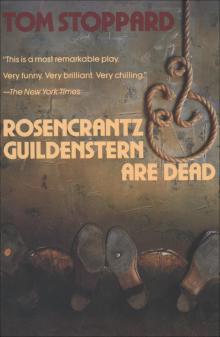 Rosencrantz and Guildenstern Are Dead
Rosencrantz and Guildenstern Are Dead Rock 'N' Roll
Rock 'N' Roll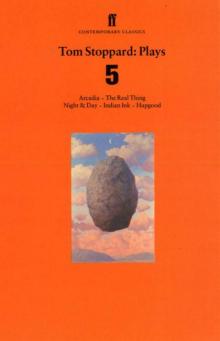 Plays 5
Plays 5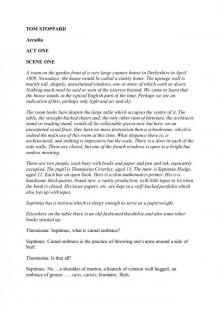 Arcadia
Arcadia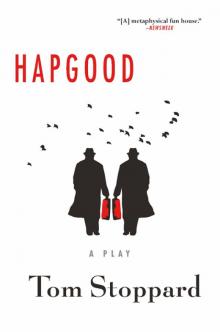 Hapgood
Hapgood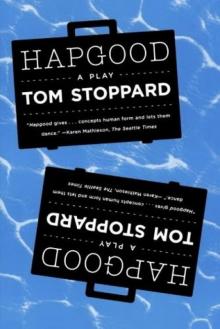 Hapgood: A Play
Hapgood: A Play Every Good Boy Deserves Favor & Professional Foul
Every Good Boy Deserves Favor & Professional Foul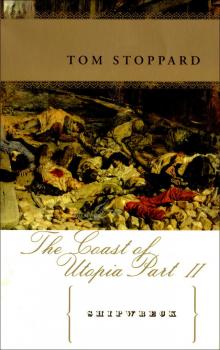 The Coast of Utopia: Voyage, Shipwreck, Salvage
The Coast of Utopia: Voyage, Shipwreck, Salvage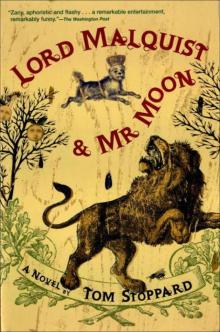 Lord Malquist & Mr. Moon
Lord Malquist & Mr. Moon The Real Inspector Hound and Other Plays
The Real Inspector Hound and Other Plays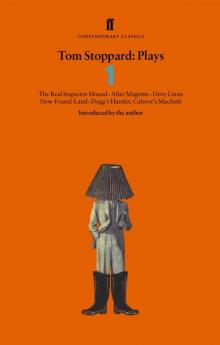 Tom Stoppard Plays 1
Tom Stoppard Plays 1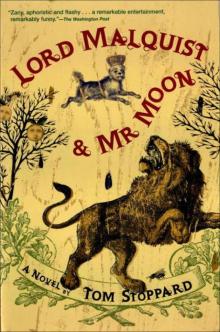 Lord Malquist & Mr. Moon: A Novel
Lord Malquist & Mr. Moon: A Novel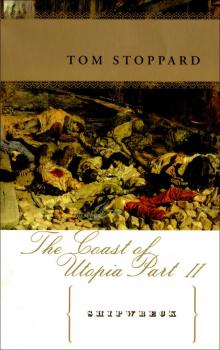 Shipwreck
Shipwreck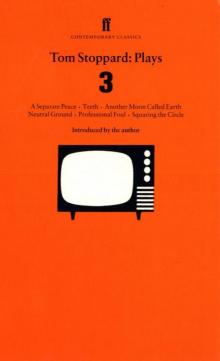 Tom Stoppard Plays 3
Tom Stoppard Plays 3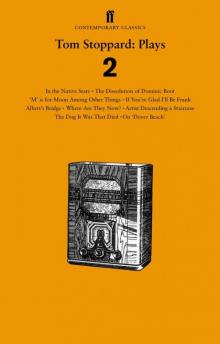 Tom Stoppard Plays 2
Tom Stoppard Plays 2 Rosencrantz and Guildenstern are dead. Arcadia
Rosencrantz and Guildenstern are dead. Arcadia